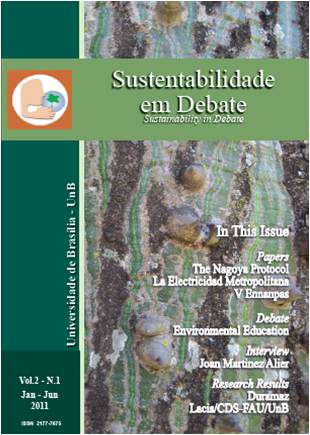The Nagoya Protocol on the use of genetic resources:
one embodiment of an endless discussion
DOI :
https://doi.org/10.18472/SustDeb.v2n1.2011.3906Mots-clés :
Recursos genéticos, Acesso e Repartição de Benefícios, BiodiplomaciaRésumé
O objetivo deste artigo é destacar o processo de negociação do Protocolo de Nagoya sobre a utilização dos recursos genéticos, adotado em outubro de 2010. Ao abordar os mitos e realidades associados à exploração da biodiversidade em uma perspectiva mais ampla, busca-se discutir como e por que os argumentos utilizados por países desenvolvidos e em desenvolvimento foram finalmente conciliados, resultando em um novo quadro jurídico internacional. O artigo demonstra em que medida este Protocolo permite aplicar o disposto na Convenção sobre a Diversidade Biológica de forma coerente `à legislação internacional pertinente (por exemplo, referente à propriedade intelectual). Também pretende avaliar se o protocolo permitirá reduzir a sempre existente lacuna entre os conceitos jurídicos construídos pela «biodiplomacia» e as necessidades reais e práticas de cientistas e empresas. Por último, procura estimar o impacto deste documento e sua aplicação sobre as estruturas já existentes, com foco na experiência brasileira.
Références
BOISVERT Valérie (dir.). Les marchés de la
biodiversité. Paris: Éditions de l’IRD, 2007. 269
p.
Earth Negotiations Bulletin, Summary of the
Tenth Conference of the Parties to the
Convention on Biological Diversity: 18-29
October 2010, Vol. 9 n° 5442, Monday, 1
November 2010/ http://www.iisd.ca/bioidv/
cop10/
ETC GROUP. The New Biomassters -
Synthetic Biology and The Next Assault on Biodiversity and Livelihoods; Geopiracy: The
Case Against Geoengineering, new report.
2010. http://www.etcgroup.org/en/node/5229
FILOCHE Geoffroy. Les connaissances,
innovations et pratiques traditionnelles en
matière de biodiversité : un kaléidoscope
juridique. Droit et Société, n° 72 (2), 2009. pp.
433-456.
SECRETARIAT OF THE CONVENTION ON
BIOLOGICAL DIVERSITY. Global
Biodiversity Outlook 3 (GBO-3). Montreal,
2010. 94 p. http://gbo3.cbd.int/
UNEP/CDB/COP/DEC/X/, Nagoya Protocol on
Access to Genetic Resources and the Fair and
Equitable Sharing of Benefits Arising from
their utilization, 2010, 25 p. http://www.cbd.int/
nagoya/outcomes/
Téléchargements
Publié
Numéro
Rubrique
Licence
© Sustentabilidade em Debate 2011

Cette œuvre est sous licence Creative Commons Attribution - Pas d'Utilisation Commerciale - Pas de Modification 4.0 International.
SUSTAINABILITY IN DEBATE – Copyright Statement
The submission of original scientific work(s) by the authors, as the copyright holders of the text(s) sent to the journal, under the terms of Law 9.610/98, implies in the concession of copyrights of printed and/or digital publication to the Sustainability in Debate Journal of the article(s) approved for publication purposes, in a single issue of the journal. Furthermore, approved scientific work(s) will be released without any charge, or any kind of copyright reimbursement, through the journal’s website, for reading, printing and/or downloading of the text file, from the date of acceptance for publication purposes. Therefore, the authors, when submitting the article (s) to the journal, and gratuitous assignment of copyrights related to the submitted scientific work, are fully aware that they will not be remunerated for the publication of the article(s) in the journal.
The Sustainability in Debate Journal is licensed under Creative Commons License – Non-Commercial-No-Derivation Attribution (Derivative Work Ban) 3.0 Brazil, aiming at dissemination of scientific knowledge, as indicated on the journal's website, which allows the text to be shared, and be recognized in regards to its authorship and original publication in this journal.
Authors are allowed to sign additional contracts separately, for non-exclusive distribution of the works published in the Sustainability in Debate Journal (for example, in a book chapter), provided that it is expressed the texts were originally published in this journal. Authors are allowed and encouraged to publish and distribute their text online, following publication in Sustainability in Debate (e.g. in institutional repositories or their personal pages). The authors expressly agree to the terms of this Copyright Statement, which will be applied following the submission and publishing by this journal.









